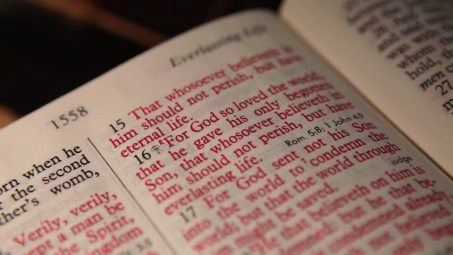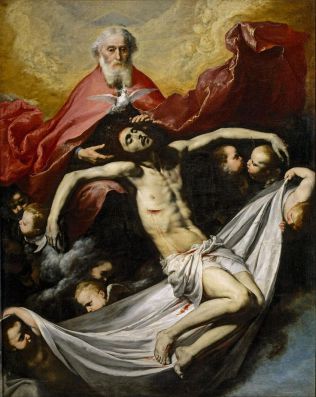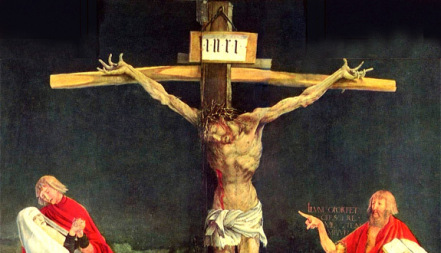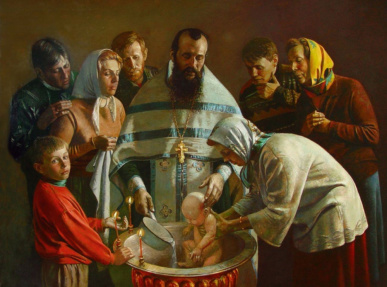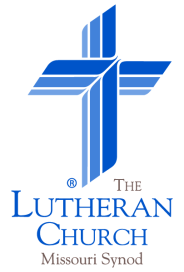The Bible
We believe, teach, and confess that Holy Scripture (the 66 canonical books of the Old and New Testament) differ from all other books in the world, for the Bible is the very Word of God. What's more, we believe that every word in Scripture is God's Word (even the hard parts). We believe what Scripture says about itself. For example:
- "All Scripture is breathed out by God and profitable for teaching, for reproof, for correction, and for training in righteousness" (2 Ti 3:16).
- "For no prophecy was ever produced by the will of man, but men spoke from God as they were carried along by the Holy Spirit" (2 Pt 1:21).
- "The Word of the Lord endures forever" (Ps 119:9).
The Holy Spirit caused every Word to be written through the prophets, evangelists, and disciples. Since Scripture is the Word of God, it contains no errors or contradictions, but, in all its parts, contains the infallible truth (Jn 10:35; Rm 3:21; 1 Cor 2:13). The very Word of God gives the faith to believe this sacred mystery.
Furthermore, the Bible says, "Long ago, at many times and in many ways, God spoke to our fathers by the prophets, but in these last days He has spoken to us by His Son" (Hb 1:1-2). His revelation is complete. For this reason we do not search for the Word, Will, or Revelation of God in "signs and wonders," that is, apart from the words of Holy Scripture... rather, with complete confidence, we find His Word, Will, and Revelation in the words of Holy Scripture, which He has graciously given to us.
God
Because Holy Scripture is the Word of God, we believe, teach, and confess the Triune God: the One true God (Dt 6:4; 1 Cor 8:4) is the Father and the Son and the Holy Spirit. He tells us that He is three distinct persons, but of one and the same divine essence. These three persons are equal in power, equal in eternity, and equal in majesty, for each person of the Most Holy Trinity possesses the one divine essence entirely (Col 2:9; Mt 28:19).
We hold that all teachers and religions that deny the doctrine of the Holy Trinity are outside of the Christian Church. The Triune God is the God who is gracious to man (Jn 3:16-18; 1 Cor 12:3). Since the Fall of man (Gn 1-3), no man can believe in the "fatherhood" of God except he that believes in the eternal Son of God, who became man and reconciled us to God by His vicarious satisfaction (1 Jn 2:23; Jn 14:6).
This is a sacred mystery. We do not seek to explain the Trinity through analogy, metaphor, or simile. Reason cannot comprehend our God; rather, the Triune God gives us faith to believe in the Trinity. We do not explore the Trinity, we adore Him. We worship the Unity in Trinity and the Trinity in Unity, as confessed in the Athanasian Creed.
Salvation
When the eternal Triune God created all things in the universe, He made all things good (Gn 1-2). He created the first humans, Adam and Eve, in His own image (Gn 1:26, 27; Eph 4:24; Col 3:10)... that is, in true knowledge of God and in true righteousness and holiness and endowed with a truly scientific knowledge of nature (Gn 2:19-23). No sin existed, no hurt, no sickness, no death.
However, sin came into the world by the Fall of the first man, as described in Genesis 3. By this Fall not only he himself, but also his natural offspring have lost the original knowledge, righteousness, and holiness, and thus all men are sinners by birth, dead in sins, inclined to evil, and subject to the wrath of God (Rm 5:12, 18; Eph 2:1-3). Now,m We teach that mankind is unable, through any efforts of their own, to reconcile themselves to God. We are born "dead in our transgressions" (Eph 2:1) and need God to save us, to be made alive through forgiveness of our sins.
For this reason, God sent His only begotten Son into the world to redeem us from sin, death, and the devil. We "believe that Jesus Christ, true God, begotten of the Father from eternity, and also true man, born of the Virgin Mary, is the Lord, who has redeemed us, lost and condemned creatures, purchased and won us from all sins, death, and from the power of the devil, not with gold or silver, but with His holy, precious blood and with His innocent suffering and death, so that we may be His own, and live under Him in His kingdom, and serve Him in everlasting righteousness, innocence, and blessedness, even as He is risen from the dead, lives and reigns to all eternity" (Gal 4:4, 5; 3:13; 2 Cor 5:18, 9; Jn 3:16-18, etc.).
This Gospel is preached to all people, to the end that they may believe it (2 Cor 5:18, 19; Rm 1:5). Therefore, God-given faith in Christ is the only way for us to obtain reconciliation with God, that is, the forgiveness of sins, as both the Old and the New Testament Scriptures testify (Acts 10:43; Jn 3:16-18). By this faith in Christ, through which we obtain the forgiveness of sins, is without any human effort to fulfill the Law of God after the example of Christ, but faith in the Gospel, that is, in the forgiveness of sins won by Christ and offered to us by the Gospel. This faith justifies, not as our work, but laying hold of the grace given in Christ (Rm 4:16).
As a result of the free gift of salvation given by Christ, the Christian does good works by grace through faith (Jn 15:4, 5). Good works never precede faith but are always and in every instance the result of faith in the Gospel. It is evident that the only means by which we Christians can become rich in good works (Titus 2:14) is to unceasingly remember the grace of God which we have received in Christ (Rm 12:1; 2 Cor 8:9). Good works do not merit or earn salvation. Good works are a result of salvation given by grace through faith in Christ.
Holy Baptism
Although God is present and works everywhere throughout all creation and the whole earth (Col 1:17; Acts 17:28, 14:17), we still hold with Scripture that God offers and communicates to us the forgiveness Christ won only through the external means of grace ordained by Him. These precious means of grace are the Word of the Gospel, Absolution, Baptism, and the Lord's Supper. The Word of the God promises and declares the grace of God, works faith and regenerates us, and gives us the Holy Ghost (Acts 20:24; Rm 10:17; 1 Pt 1:23; Gal 3:2).
Baptism is not our work; it is God's, given us for the forgiveness of sins. It is the washing of regeneration and renewing of the Holy Spirit (Acts 2:38; 22:16; Titus 3:5). That means it is not simple water only, but it is the water combined with God's command and included with His Word (Mt 28). Baptism gives forgiveness, delivers from death and the devil, and gives eternal salvation to all who believe this, as the words and promises of God declare. Scripture testifies:
- "He that believes and is baptized shall be saved; but he that does not believe will be condemned" (Mk 16:16).
- "Repent and be baptized every one of you in the name of Jesus Christ for the forgiveness of your sins, and you will receive the gift of the Holy Spirit" (Acts 2:38).
- "Baptism, which corresponds to this [the flood], now saves you, not as a removal of dirt from the body but as an appeal to God for a good conscience, through the resurrection of Jesus Christ" (1 Pt 3:21).
We therefore reject the teaching that Baptism is our work, or that it is merely a symbol or act of obedience and dedication of ourselves to God. Since Baptism is God's Work, not ours, and since salvation is a gift from God, not earned (Eph 2:8-9), our churches baptize infants since they are sinners and in need of blessing (Mt 19:15; Mk 10:16), and since they too can have faith by the Word of God (Lk 1:41-44). Baptism saves you. This is God's promise. It is not our dedication to Him, but His dedication to us, for He has loved us before we could ever love Him.
The Lord's Supper
The Lord's Supper is the true body and blood of our Lord Jesus Christ, under the bread and wine, instituted by Christ Himself for us Christians to eat and to drink. It is the ministration of His very Body and Blood. It gives exactly what it says: "the forgiveness of sins," as the words declare: "Given for you," and: "Shed for you for the forgiveness of sins," (Lk 22:19, 20; Mt 26:28), and "This cup is the New Testament in My blood" (1 Cor 11:23; Jer 31:31-34). In the Lord's Supper, we receive Christ's very body and blood into our mouths, not in a spiritual way, but truly, physically.
This is a sacred mystery revealed in Scripture and believed by faith. Christ is truly present, not because of our faith, but because of His promise in the Word. Therefore, those who do not truly believe still receive Christ's body and blood in the Lord's Supper (1 Cor 11:27ff.). Those who do not understasnd this or are unprepared (that is, who have no repentance or faith) therefore receive it to their judgment. For this reason, our congregation practices the ancient and Biblical practice of Closed Communion. This is an act of love on behalf of the Church to protect people from receiving it unworthily and to their harm.
The Lord's Supper is celebrated at this congregation in the confession and glad confidence that, as He says, our Lord gives into our mouths not only bread and wine but His very body and blood to eat and drink for the forgiveness of sins and to strengthen our union with Him and with one another. Our Lord invites to His table those who trust His words, repent of all sin, and set aside any refusal to forgive and love as He forgives and loves us, that they may show forth His death until He comes.
Because those who eat and drink our Lord's body and blood unworthily do so to their great harm and because Holy Communion is a confession of the faith which is confessed at this altar, any who are not yet instructed, in doubt, or who hold to a confession differing from that of this congregation and the Lutheran Church—Missouri Synod (LC-MS), and yet desire to receive this sacrament, are asked first to speak with the pastor.
It is our desire that all people would commune with us, but out of high regard for God's Word, we believe, teach, and confess that unity in confession comes before unity in communion. Therefore, we invite everyone to make their confession of faith before God and man. God asks that the pastor, the congregation, and you to all believe, teach, and confess the same thing! If you attend another church from another denomination, and if your confession is at all different from ours, we will let you know! We simply ask that you give us the chance to instruct you on why we believe what we believe! Then, if you certainly are united in the same confession with us at St. Paul's, then we would gladly welcome you as a member of this church! Know that this is all done purely out of love for God, care for you, and for true unity in our church! We hope that you give us the opportunity to share with you this wonderful news!
Our congregations are members of the Lutheran Church-Missouri Synod (LC-MS). For more information, and wealth of Christ-centered information and teachings, click here.
We subscribe unconditionally to the Book of Concord of 1580, for it is a true and genuine exposition of the doctrines and Bible. The Book of Concord contains the following articles: the Apostles’ Creed, Nicene Creed, and Athanasian Creed; the Unaltered Augsburg Confession, the Apology of the Augsburg Confession, the Smalcald Articles, Luther’s Large and Small Catechisms, and the Formula of Concord. Click HERE to explore it.

